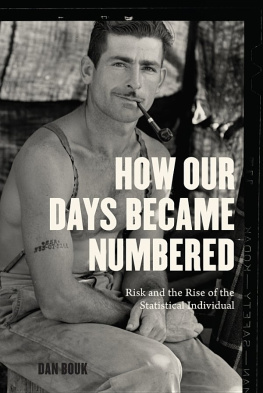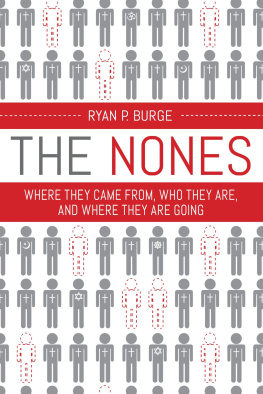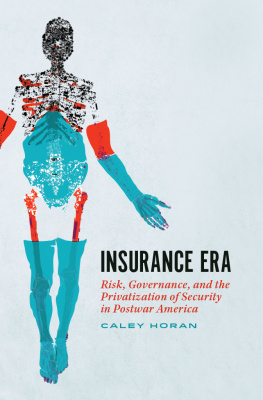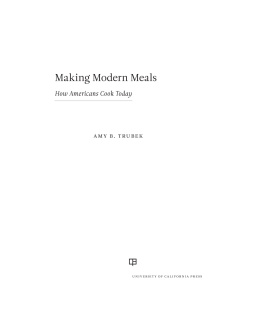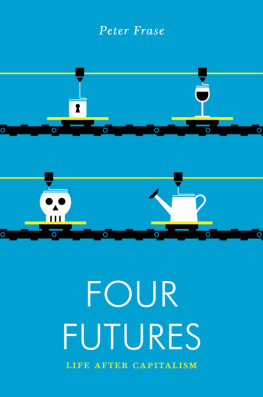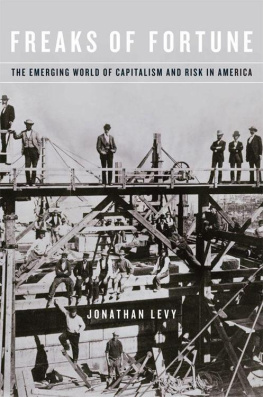How Our Days Became Numbered
Risk and the Rise of the Statistical Individual
DAN BOUK
The University of Chicago Press
Chicago and London
Dan Bouk is assistant professor of history at Colgate University and a member of the Historicizing Big Data working group at the Max Planck Institute for History of Science.
The University of Chicago Press, Chicago 60637
The University of Chicago Press, Ltd., London
2015 by The University of Chicago
All rights reserved. Published 2015.
Printed in the United States of America
24 23 22 21 20 19 18 17 16 15 1 2 3 4 5
ISBN-13: 978-0-226-25917-8 (cloth)
ISBN-13: 978-0-226-25920-8 (e-book)
DOI: 10.7208/chicago/9780226259208.001.0001
Library of Congress Cataloging-in-Publication Data
Bouk, Daniel B., 1980 author.
How our days became numbered : risk and the rise of the statistical individual / Dan Bouk.
pages cm
Includes bibliographical references and index.
ISBN 978-0-226-25917-8 (cloth : alkaline paper)ISBN 0-226-25917-X (cloth : alkaline paper)ISBN 978-0-226-25920-8 (e-book)ISBN 0-226-25920-X (e-book) 1. Life insuranceUnited StatesHistory. 2. InsuranceStatistical methodsHistory. 3. Insurance companiesSocial aspectsUnited States. I. Title.
HG8531.B68 2015
368.3200973dc23
2014039799
This paper meets the requirements of ANSI/NISO Z39.481992 (Permanence of Paper).
For my parents,
Gail and Ted Bouk
For all our days are passed away in thy wrath: we spend our years as a tale that is told. / The days of our years are threescore years and ten; and if by reason of strength they be fourscore years, yet is their strength labour and sorrow; for it is soon cut off, and we fly away. / Who knoweth the power of thine anger? even according to thy fear, so is thy wrath. / So teach us to number our days, that we may apply our hearts unto wisdom.
PSALM 90:912, King James Bible
Do you suppose, he can be estimated by his weight in pounds, or, that he is contained in his skin,this reaching, radiating, jaculating fellow?
RALPH WALDO EMERSON , Fate, from Conduct of Life
CONTENTS
Strange Books
How Our Days Became Numbered tells the story behind the books of figures that captured Cains imagination, a story of Americans seeking certainty and security in an unsettled, industrializing nation and becoming statistical subjects in the process. It tells a story of those who became the sometimes grudging objects of powerful corporations efforts to forecast their deaths in the years after the Panic of 1873, of those who more happily accepted corporate help to lengthen their lives in the early twentieth century, and of those who submitted to a new system created by the United States government during the Great Depression that would predict the course of their wage-earning lives. It tells the story of statistical systems built around promises of protection from financial ruin that developed into systems for strengthening and reforming bodies too. Such systems made Americans into risks and in the process numbered their days.
Three years before Cains book appeared, in 1933, Metropolitan Life Insurance Company statisticians Louis Dublin and Bessie Bunzel published To Be or Not to Be: A Study of Suicide. Page 59 featured a table of suicides from jumping, and while it failed to distinguish between leaps under And the book made age, sex, occupation, location, and race crucial factors in explaining and understanding suicide. Cain exaggerated the details, but not the spirit of the enterprise.
Dublin and Bunzels book belonged to a long tradition in and around life insurers offices Statistical knowledge became, in the proper hands, evidence of regularities, even laws of (human) nature. With such knowledge, one could predict the future in broad strokes; one could read groups fates; one could number a nations days.
Yet Cains story also reveals an impulse that reached past the usual goals of statistics and probability, past merely gaining certain knowledge about populations, to the more difficult puzzle of securing insights into the lives and fates of individuals. Cain solved the problem like a novelisthe invented a situation that statistics showed to be impossible, a situation that involved no chance. But actual life insurers struggled to square probabilistic, statistical methods with a business that contracted with individualsindeed, a business that often treated individuals differently, demanding of one applicant more payment, rewarding to anothers bereaved family a smaller claim. Statistical and probabilistic methods could not discriminate so finely: they did not deal with individuals. So life insurers brought in lawyers and investigators, and most importantly, doctorsalongside countless clerks and tabulating machinesto process, evaluate, and forecast individual lives.
When we think of science and life insurance or science and risk, we usually think about actuaries (as did Cain, incorrectly)in no small part because life insurers touted their reliance on accomplished mathematicians capable of revealing statistical laws of nature. actually been responsible for Cains imagined catalog of fates.
Insurers hedged their bets by roping the probabilistic to the particular, the actuary to the doctor. They at once proclaimed the surety of statistical laws, but acted as if they could beat the averagesclaiming that they could pick only the better lives and avoid those doomed to die too soon. Such hedging came at a cost. Cains never-recorded suicide from the back of a slow-moving train neatly avoided the troubling tension between smoothing away particularities, as the actuaries advocated, and classing all experience into tiny boxes, as doctors preferred. That tension bedeviled life insurers as their networks expanded and their coffers filled with cash. The question that Cain avoided asking was voiced over and over in the late nineteenth century, in private corner offices and in the peoples legislative halls: how should these powerful corporations, their fancy mathematics tensely tied to their surveying ambitions, be allowed to relate to Americans in groups or alone?
A new possible answer came in the early twentieth century in a development that the novelist Cain failed to grasp. For while Cain explored for life insurers tools to migrate into more settings, touch more lives, and foretell more fates than purely mortal ones. Yet even as it allowed our days to be more fully numbered, the transition from prediction to control still failed to solve life insurers persistent puzzle; it failed to finally reconcile the individual to the statistical.
***
I began writing this book fascinated the peculiarly powerful way that American capitalism translates people into numbers.
For help in learning how to interpret these books, I looked to historians efforts over the last few decades to integrate numbers and statisticsas the stuff of cultureinto our understanding of modern American life. Their writings taught me how numbers spread across modern societies: how a quantifying Numbers, as much as words or wood-cuts, pulsed through American culture.
As I read, I came away especially impressed by the power historians
But books like The Money Value of a Man or How to Live, though published during those peak years of aggregation, pointed to a problem with this standard narrative. Here were cultural artifacts rooted in statistics and quantification, but they focused on assigning dollar values to one man at a time and on helping each person learn to live more healthfullyout of statistical materials, these books drew individualized conclusions. I read individuation in their pages as much as aggregation.

